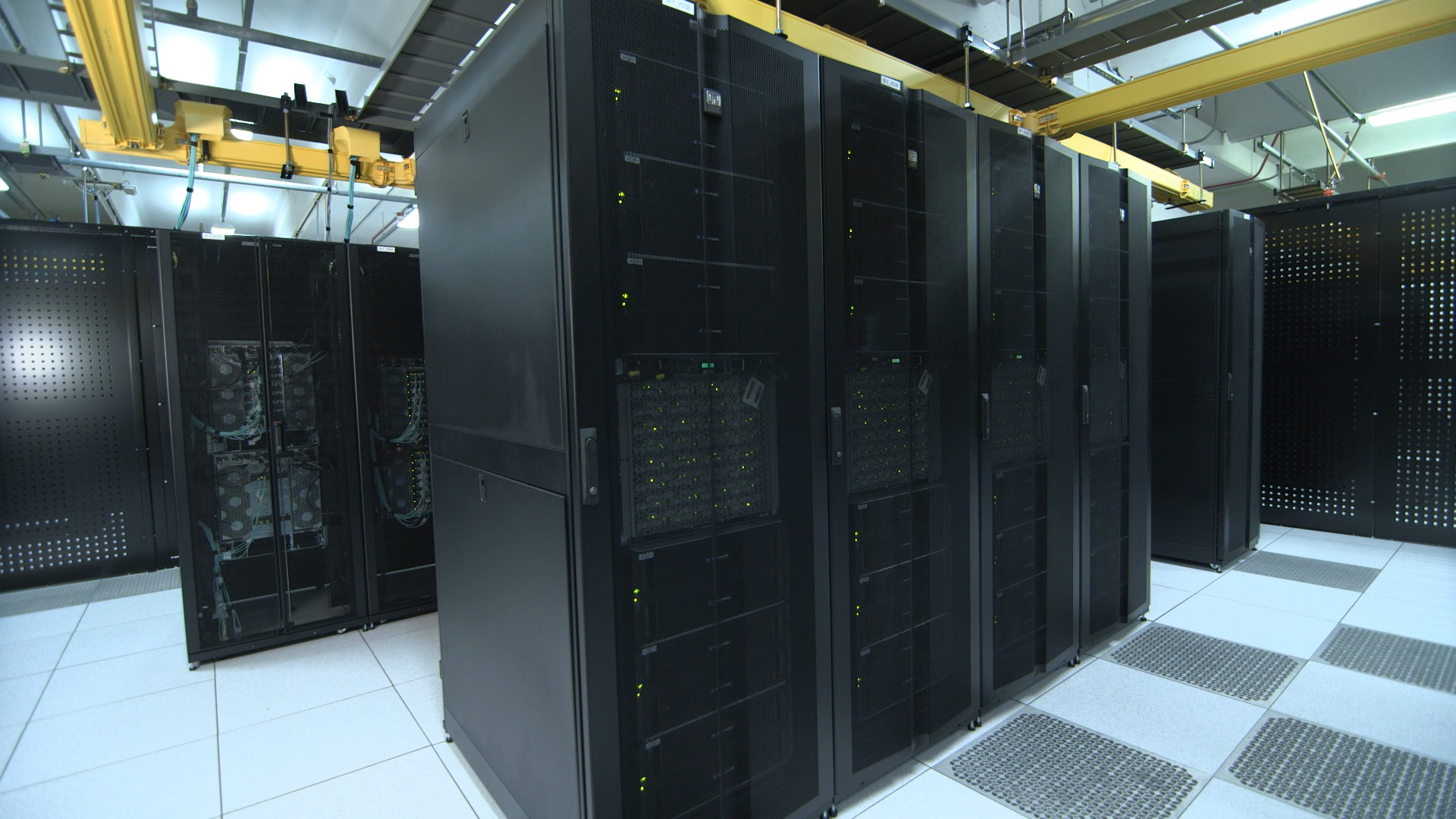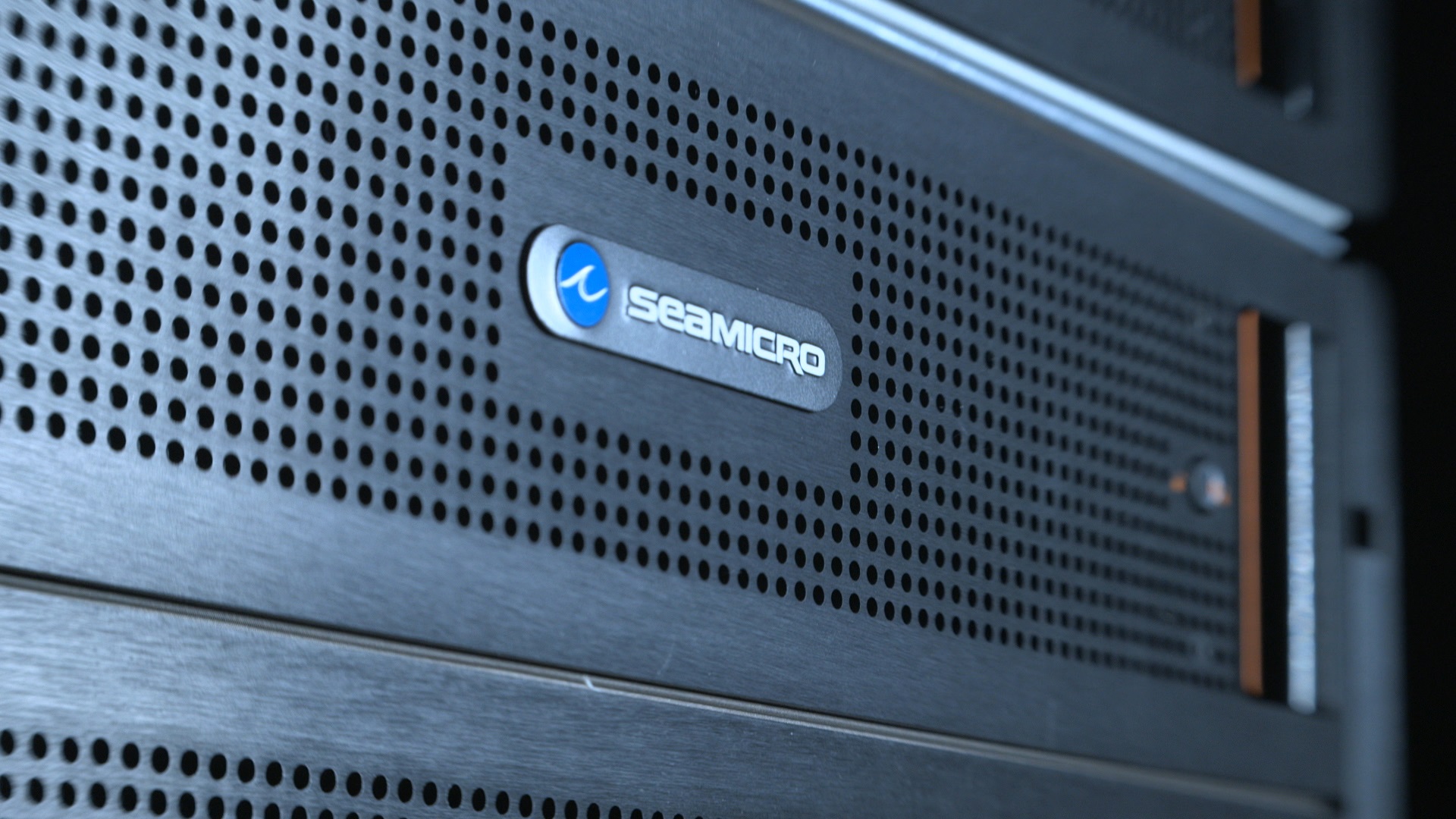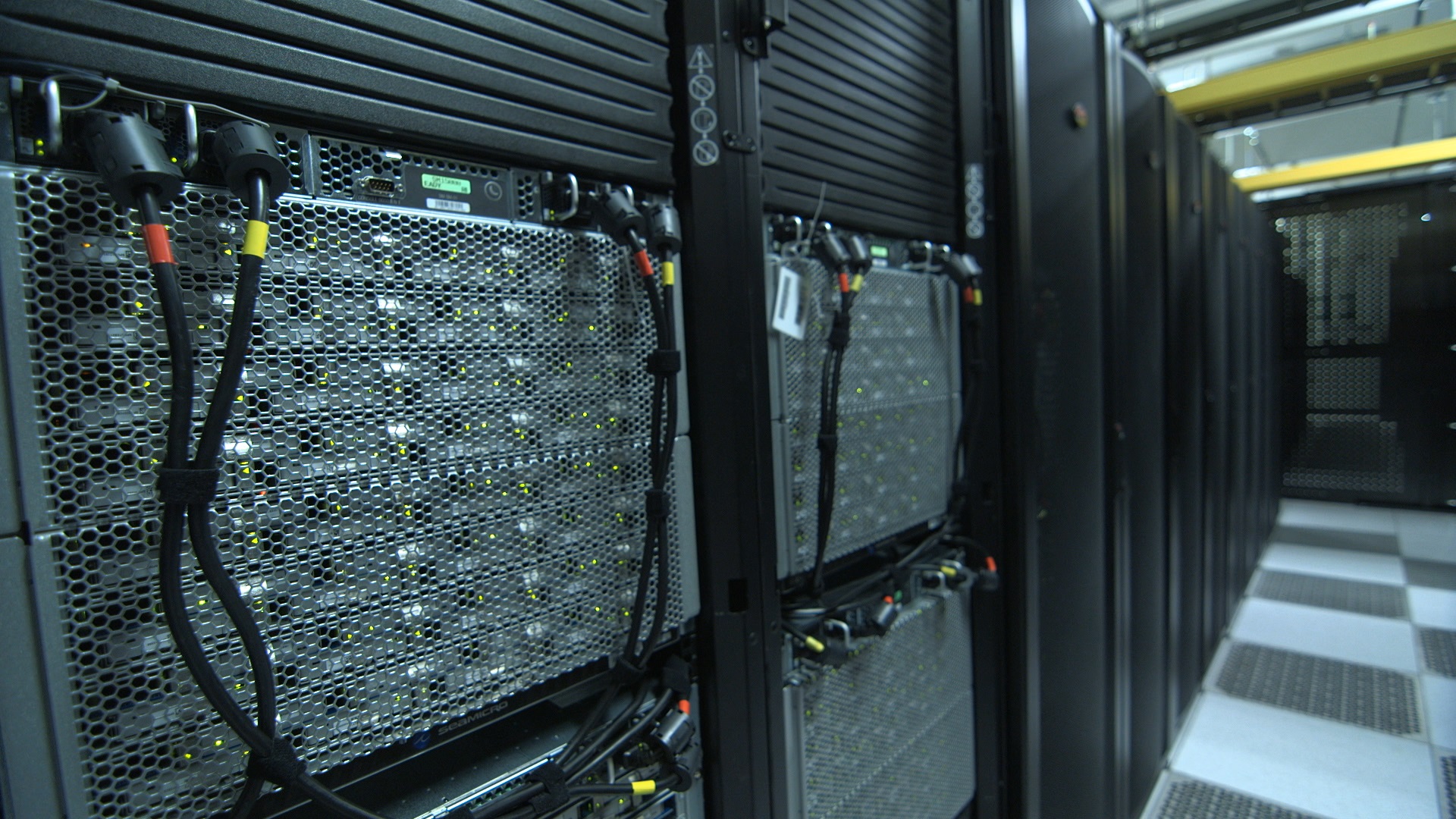Verizon is launching its new public cloud later this year and offering both compute and storage to enterprise customers. The Verizon Cloud Compute and Cloud Storage products will be hosted on AMD SM15000 servers in a multi-rack cluster built by Verizon-owned Terremark.
The new cloud service is powered by AMD SM15000 servers with are 10U units with multiple microservers interconnected by SeaMicro's Freedom Fabric technology. Verizon is aiming the new cloud service at business users, from SMBs to fortune 500 companies. Specifically, Verizon is hoping to entice IT departments to offload internal company applications and services to the Verizon Cloud Compute and Cloud Storage offerings. Using the SeaMicro-built (now owned by AMD) servers, Verizon has a high density, efficient infrastructure that can allegedly provision and deploy virtual machines with fine tuned specifications and performance and reliability backed by enterprise-level SLAs while being compliant with PCI and DoD standards for data security.
Verizon will be launching Cloud Compute and Cloud Storage as a public beta in Q4 of this year. Further, the company will be taking on beta customers later this month.
The AMD SM15000 is a high performance, high density server, and is an interesting product for cloud services thanks to the networking interconnects and power efficient compute cards. Verizon and AMD have been working together for the better part of two years on the cloud platform using the servers which were first launched to the public a little more than a year ago.
The SM15000 is a 10U server that is actually made up of multiple compute cards. AMD and SeaMicro also pack the server with a low latency and high bandwidth networking fabric to connect the servers to each other, multiple power supplies, and the ability to connect to a shared pool of storage that each compute card can access. Each compute card uses a small, cut down motherboard, processor, ram, and networking IO. The processors can be AMD Opteron, Intel Xeon, or Intel Atom with the future possibility of an AMD APU-based server (which is the configuration option that I am most interested in). In this case, Verizon appears to be using AMD Opteron chips, which means each compute card has a single eight core AMD Opteron CPU clocked at up to 2.8GHz, 64GB of system memory, and a 10Gbps networking link.
In total, each SM15000 server is powered by 512 CPU cores, up to 4TB of RAM, ten 1,100W PSUs, and support for more than 5PB of shared storage. Considering Verizon is using multiple racks filled with SM15000 servers, there is a lot of hardware on offer to support a multitude of mission critical applications backed by SLAs (service level agreements, which are basically guarantees of uptime and/or performance).
I'm looking forward to seeing what sorts of things customers end up doing with the Verizon Cloud and how the SeaMicro-built servers hold up once the service is fully ramped up and utilized.
You can find more information on the SM15000 servers in my article on their initial debut. Also, the full press release on the Verizon Cloud is below.
Verizon Selects AMD’s SeaMicro SM15000 for Enterprise Class Services: Verizon Cloud Compute and Verizon Cloud Storage
Verizon and AMD create technology that transforms the public cloud, delivering the industry’s most advanced cloud capabilitiesSUNNYVALE, Calif., Oct. 7, 2013 – AMD (NYSE: AMD) today announced that Verizon is deploying SeaMicro SM15000™ servers for its new global cloud platform and cloud-based object storage service, whose public beta was recently announced. AMD’s SeaMicro SM15000 server links hundreds of cores together in a single system using a fraction of the power and space of traditional servers. To enable Verizon’s next generation solution, technology has been taken one step further: Verizon and AMD co-developed additional hardware and software technology on the SM15000 server that provides unprecedented performance and best-in-class reliability backed by enterprise-level service level agreements (SLAs). The combination of these technologies co-developed by AMD and Verizon ushers in a new era of enterprise-class cloud services by enabling a higher level of control over security and performance SLAs. With this technology underpinning the new Verizon Cloud Compute and Verizon Cloud Storage, enterprise customers can for the first time confidently deploy mission-critical systems in the public cloud.
“We reinvented the public cloud from the ground up to specifically address the needs of our enterprise clients,” said John Considine, chief technology officer at Verizon Terremark. “We wanted to give them back control of their infrastructure – providing the speed and flexibility of a generic public cloud with the performance and security they expect from an enterprise-grade cloud. Our collaboration with AMD enabled us to develop revolutionary technology, and it represents the backbone of our future plans.”
As part of its joint development, AMD and Verizon co-developed hardware and software to reserve, allocate and guarantee application SLAs. AMD’s SeaMicro Freedom™ fabric-based SM15000 server delivers the industry’s first and only programmable server hardware that includes a high bandwidth, low latency programmable interconnect fabric, and programmable data and control plane for both network and storage traffic. Leveraging AMD’s programmable server hardware, Verizon developed unique software to guarantee and deliver reliability, unheralded performance guarantees and SLAs for enterprise cloud computing services.
“Verizon has a clear vision for the future of the public cloud services—services that are more flexible, more reliable and guaranteed,” said Andrew Feldman, corporate vice president and general manager, Server, AMD. “The technology we developed turns the cloud paradigm upside down by creating a service that an enterprise can configure and control as if the equipment were in its own data center. With this innovation in cloud services, I expect enterprises to migrate their core IT services and mission critical applications to Verizon’s cloud services.”
“The rapid, reliable and scalable delivery of cloud compute and storage services is the key to competing successfully in any cloud market from infrastructure, to platform, to application; and enterprises are constantly asking for more as they alter their business models to thrive in a mobile and analytic world," said Richard Villars, vice president, Datacenter & Cloud at IDC. "Next generation integrated IT solutions like AMD's SeaMicro SM15000 provide a flexible yet high-performance platform upon which companies like Verizon can build the next generation of cloud service offerings."
Innovative Verizon Cloud Capabilities on AMD’s SeaMicro SM15000 Server Industry Firsts
Verizon leveraged the SeaMicro SM15000 server’s ability to disaggregate server resources to create a cloud optimized for computing and storage services. Verizon and AMD’s SeaMicro engineers worked for over two years to create a revolutionary public cloud platform with enterprise class capabilities.
These new capabilities include:
Virtual machine server provisioning in seconds, a fraction of the time of a legacy public cloud;
Fine-grained server configuration options that match real life requirements, not just small, medium, large sizing, including processor speed (500 MHz to 2,000 MHz) and DRAM (.5 GB increments) options;
Shared disks across multiple server instances versus requiring each virtual machine to have its own dedicated drive;
Defined storage quality of service by specifying performance up to 5,000 IOPS to meet the demands of the application being deployed, compared to best-effort performance;
Consistent network security policies and procedures across the enterprise network and the public cloud;
Strict traffic isolation, data encryption, and data inspection with full featured firewalls that achieve Department of Defense and PCI compliance levels;
Guaranteed network performance for every virtual machine with reserved network performance up to 500 Mbps compared to no guarantees in many other public clouds.
The public beta for Verizon Cloud will launch in the fourth quarter. Companies interested in becoming a beta customer can sign up through the Verizon Enterprise Solutions website: www.verizonenterprise.com/verizoncloud.AMD’s SeaMicro SM15000 Server
AMD’s SeaMicro SM15000 system is the highest-density, most energy-efficient server in the market. In 10 rack units, it links 512 compute cores, 160 gigabits of I/O networking, more than five petabytes of storage with a 1.28 terabyte high-performance supercompute fabric, called Freedom™ Fabric. The SM15000 server eliminates top-of-rack switches, terminal servers, hundreds of cables and thousands of unnecessary components for a more efficient and simple operational environment.
AMD’s SeaMicro server product family currently supports the next generation AMD Opteron™ (“Piledriver”) processor, Intel® Xeon® E3-1260L (“Sandy Bridge”) and E3-1265Lv2 (“Ivy Bridge”) and Intel® Atom™ N570 processors. The SeaMicro SM15000 server also supports the Freedom Fabric Storage products, enabling a single system to connect with more than five petabytes of storage capacity in two racks. This approach delivers the benefits of expensive and complex solutions such as network attached storage (NAS) and storage area networking (SAN) with the simplicity and low cost of direct attached storage.
For more information on the Verizon Cloud implementation, please visit: www.seamicro.com/vzcloud.
About AMD
AMD (NYSE: AMD) designs and integrates technology that powers millions of intelligent devices, including personal computers, tablets, game consoles and cloud servers that define the new era of surround computing. AMD solutions enable people everywhere to realize the full potential of their favorite devices and applications to push the boundaries of what is possible. For more information, visit www.amd.com.
###AMD, the AMD Arrow logo, SeaMicro, AMD Opteron, SM15000, Freedom and combinations thereof, are trademarks of Advanced Micro Devices, Inc. Other names are for informational purposes only and may be trademarks of their respective owners.









I wish I had this in my
I wish I had this in my basement with terminals in every room.
Just sayin… COOL!
This cloud service targeted businesses, offering both compute and storage solutions [1]. They aimed to attract companies to move their applications and data to the cloud.